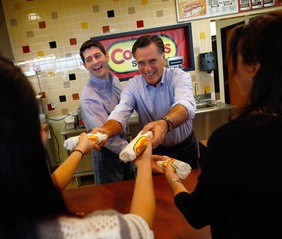The new Pope appears to be taking the church back to basics.
Reuters via NYTs:
VATICAN CITY — Pope Francis attacked unfettered capitalism as "a new
tyranny" and beseeched global leaders to fight poverty and growing
inequality, in a document on Tuesday setting out a platform for his
papacy and calling for a renewal of the Catholic Church.
The 84-page document, known as an apostolic exhortation, was the first
major
work he has authored alone as pope and makes official many views
he has aired in sermons and remarks since he became the first
non-European pontiff in 1,300 years in March.
In it, Francis went further than previous comments criticizing the
global economic system, attacking the "idolatry of money", and urged
politicians to "attack the structural causes of inequality" and strive
to provide work, healthcare and education to all citizens.
He also called on rich people to share their wealth. "Just as the commandment
'Thou shalt not kill' sets a clear limit in order to
safeguard the value of human life, today we also have to say 'thou shalt
not' to an economy of exclusion and inequality. Such an economy kills,"
Francis wrote in the document issued on Tuesday.
"How can it be that it is not a news item when an elderly homeless
person dies of exposure, but it is news when the stock market loses 2
points?"
The pope said renewal of the Church could not be put off and said the
Vatican and its entrenched hierarchy "also need to hear the call to
pastoral conversion".
"I prefer a Church which is bruised, hurting and dirty because it has
been out on the streets, rather than a Church which is unhealthy from
being confined and from clinging to its own security," he wrote.
Italian theologian Massimo Faggioli greeted the work as "the manifesto
of Francis" while veteran Vatican analyst John Thavis called it a "Magna
Carta for church reform".
"The message on poverty sets Pope Francis on a collision course with
neo-liberal Catholic thought, especially in the United States," said
Faggioli, an expert on the Second Vatican Council and reform in the
Catholic Church.




